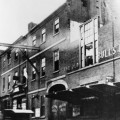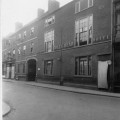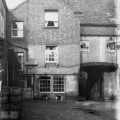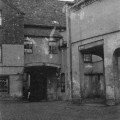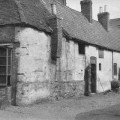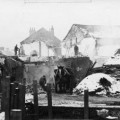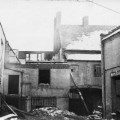Election Hustings in Old Loughborough
6 May 2015
Originating from the words hasting (Old English) or húsþing (Old Norse) meaning ‘house thing’ – a gathering of the household of a king, earl or chief – the word hustings now signifies the campaigning carried out by candidates in the lead-up to an election, in which they address potential voters and try to win their votes.
In the past, campaigning often centred around local ale houses, where the combination of alcohol, strong opinions and political dissent created a heady mix which often turned into trouble.
The Old Bull’s Head Hotel in the High Street (later rebuilt as the Black Bull and currently a gym) was Loughborough’s main coaching inn and a focal point of the town. It was frequently ‘a rough house’ at election meetings, where nominating and voting for candidates took place in the open air, for all to see.
Another hostelry which featured in electoral hustings was the Plough Inn in the Market Place, where the town’s Justices of the Peace held Petty Sessions in a room upstairs. Brick steps led up to the courtroom, whilst stone steps led to the inn. The need not to mistake the two was a local standing joke.
On one occasion, Mr E B Farnham was speaking from the Plough when a hayfork was pushed towards his face, a potato on one prong and a herring on the other, with the invitation to ‘chaw on this!’ Farnham had recently stated that a herring and a potato were good enough food for a working man.
In 1852 the Marquis of Granby addressed local electors from the courtroom of the Plough. He was supported by a crowd of farm workers brought from the other side of Leicestershire for the purpose. These were managed by a tall, stout farmer named Marriott, who prompted them to cheer whenever the Marquis made a point.
The Riot Act had to be read from the Town Hall steps during the election in 1857, when the ‘free and independent electors’ of the town, supported by a mob who weren’t entitled to vote, smashed the windows of the Bull’s Head to vent disapproval at Lord John Manners and Mr. Farnham being elected as Members of Parliament. A similar disturbance occurred at the Bull’s Head in the election of 1859.
During another election, the town centre was gridlocked from the Bull’s Head through to the entrance of the Town Hall. Lord John Manners stood in his carriage at the corner of Biggin Street and threw silver coins into the crowd.
In 1868 the crowd were once again out of sorts with Lord John Manners, who had recently voted for the retention of flogging as a form of punishment in the army. Waving cat-o-nine tails at him, the mob heckled Lord John and a second candidate – a Mr Clowes – but gave their support to a Mr Frewen, whom they seem to have viewed as the underdog. Frewen was elected by a large majority, but so was Lord John, despite having received very few votes. He was escorted away by police under a barrage of rotten eggs, rabbit skins and rubbish, to save him being torn to pieces.
This proved to be the last open nomination in the town – and possibly in England – as it was decided to be safer for candidates to be nominated inside the municipal buildings.
Alison Mott
Source: W. A. Deakin, 19th Century Loughborough, The Echo Press Limited, 1974.
- The Bulls Head, Loughborough, prior to High Street being widened in the late 1920s. Photo courtesy of leicestershirevillages.com
- The Bulls Head, Loughborough, prior to High Street being widened in the late 1920s. Photo courtesy of leicestershirevillages.com
- The rear yard of The Bulls Head, Loughborough, prior to High Street being widened in the late 1920s. Photo courtesy of leicestershirevillages.com
- The rear yard of The Bulls Head, Loughborough, prior to High Street being widened in the late 1920s. Photo courtesy of leicestershirevillages.com
- The Bulls Head, Loughborough, prior to High Street being widened in the late 1920s. Photo courtesy of leicestershirevillages.com
- The Bulls Head, being demolished to make way for the widening of the High Street being widened in the late 1920s. Photo courtesy of leicestershirevillages.com
- The Bulls Head, being demolished to make way for the widening of the High Street being widened in the late 1920s. Photo courtesy of leicestershirevillages.com
